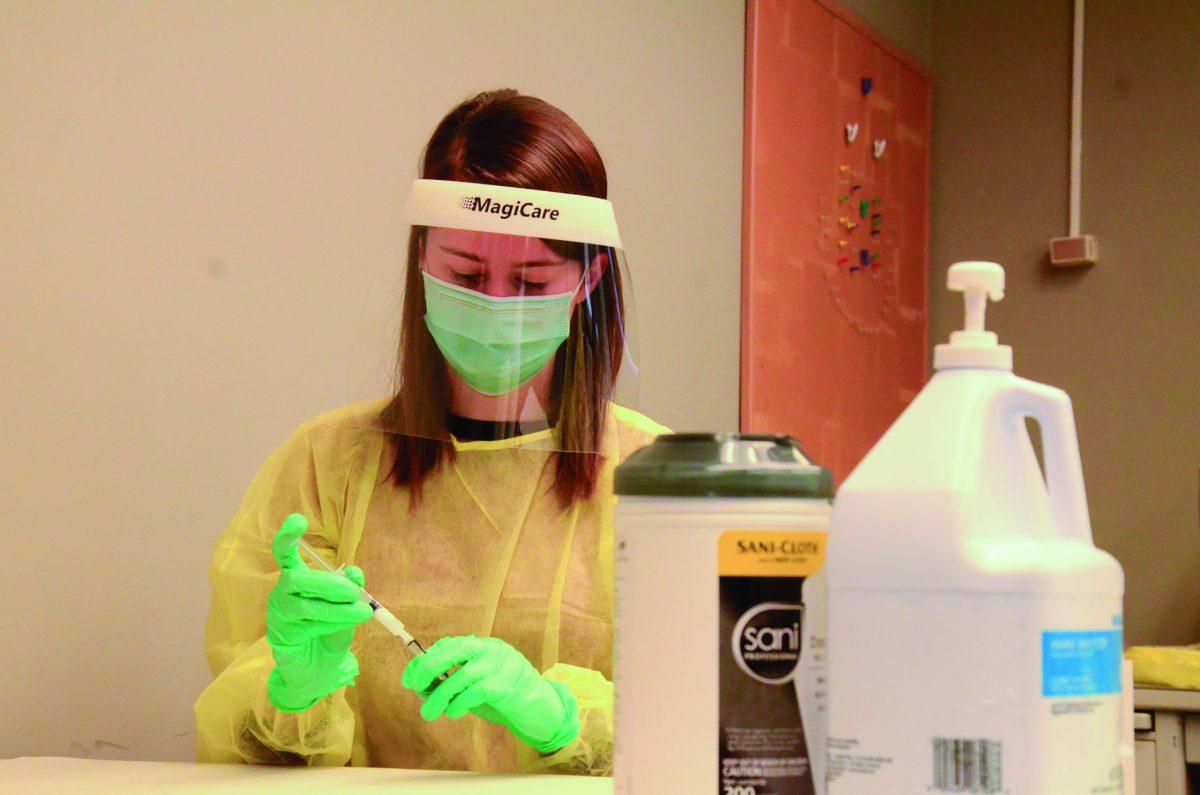Sometimes, learning takes place outside of the classroom. This has been the experience of Drake pharmacy and health sciences students, who have volunteered over the course of this semester to administer COVID testing to their peers.
According to Professor Erik Maki, chair of the Clinical Sciences Department, second-year pharmacy students undergo a national certification program for point-of-cure testing, which would qualify them to administer testing such as COVID tests.
“When [the] university started having initial conversations about testing and how we might do testing, we knew that we had a lot of students who are certified and had some practice in how to do these testing methodologies, so we thought we could be an asset to the university,” Maki said. “That’s how we started to think about how maybe we could partner with the university. Right now we have a lot of faculty with a lot of expertise and skills, and they’re all over the city in different health systems, but we haven’t traditionally provided a lot of services on campus. It seemed like a real opportunity to engage with those kinds of things.”
Maki sent out emails over the summer to pharmacy and health sciences students asking for volunteers to assist with testing during move-in.
“It was 100% completely volunteer, so we just sent out messages, not only to pharmacy students but to health sciences students,” Maki said. “Testing first started about a week before move-in day for students who live on campus and student-athletes, so we had a little bit of a trial run with how we might do it with some of the student-athlete population.”
Maki estimated that over 100 students volunteered to administer COVID testing during move-in week.
“Amazingly it all came together and we had enough volunteers,” Maki said. “For example, on Saturday we had 480 students moving in, so that was the one I was the most concerned about because that was the biggest number. From my perception, it just went really smoothly. I don’t think we ever had much of a line. It was really smooth and it worked really well.”
Maki said that he was impressed at the number of students who volunteered their first weekend on campus to assist with the COVID testing.
“I had freshmen students on Sunday volunteer who, it was their first full day on campus. They showed up the next day to do this,” Maki said. “I was just impressed with students like that who showed up and didn’t even know what they were getting themselves into. I just thought it was really neat that we had all these people who were willing to take time on a weekend to do this, and I think it shows the generosity of people in a time like this when we need it the most.”
One of these students was first-year health sciences student Chloe Herby.
“I heard about the recruitment for assisting with COVID testing administration from an email sent to all CPHS students a few days before freshman move-in,” Herby said. “I was moving in on Saturday the 15th, so I was able to register to volunteer on the 16th.”
Herby served as a labeler during move-in weekend testing, matching labels with samples and collecting student contracts.
“After confirmation of my shift, I received several emails throughout the week regarding instructions, reminders and thanks,” Herby said. “I signed up to work as a labeler for Sunday afternoon. I organized and distributed labels with students’ names and ID numbers onto the cups that students spit into and onto the plastic bag the vialed saliva would be placed in. I made sure that all other team members had the proper cup and bag for each student, as well as organizing student contracts.”
According to Herby, it gave her the opportunity to apply knowledge to a real-world situation.
“I learned that all team members are important and actions that may seem small can make a change,” Herby said. “Hands-on work is more personal and makes lessons about health sciences more realistic. Textbooks are good for a learning basis, but there is a limit
to how much one can experience and apply what one has learned.”
Volunteers have continued to help throughout the semester by administering testing to randomly selected students.
“I think students enjoy it, maybe not the saliva part, but I think they enjoyed the opportunity to do something that is helping in a time of crisis,” Maki said. “I think people get into fields like this because they want to help other people and and be part of something that’s meaningful, and I think from that aspect I do think they are enjoying it.”
According to Maki, it is also something that students can put on their resumes in the future.
“I’ve encouraged them to make sure that they’re putting this on their resumes,” Maki said. “It’s a really unique experience, and they’re just starting that job season right now. They had a career fair last week and this is just something unique that they can say they were involved with.”







